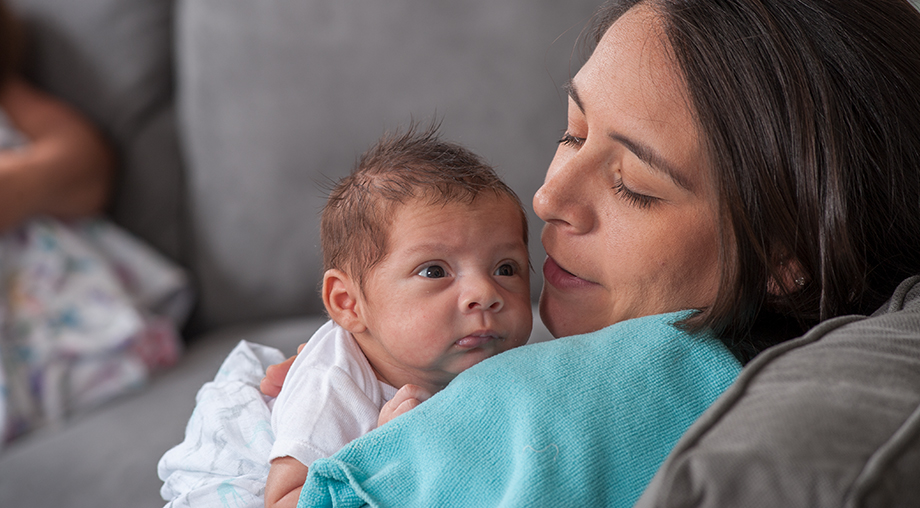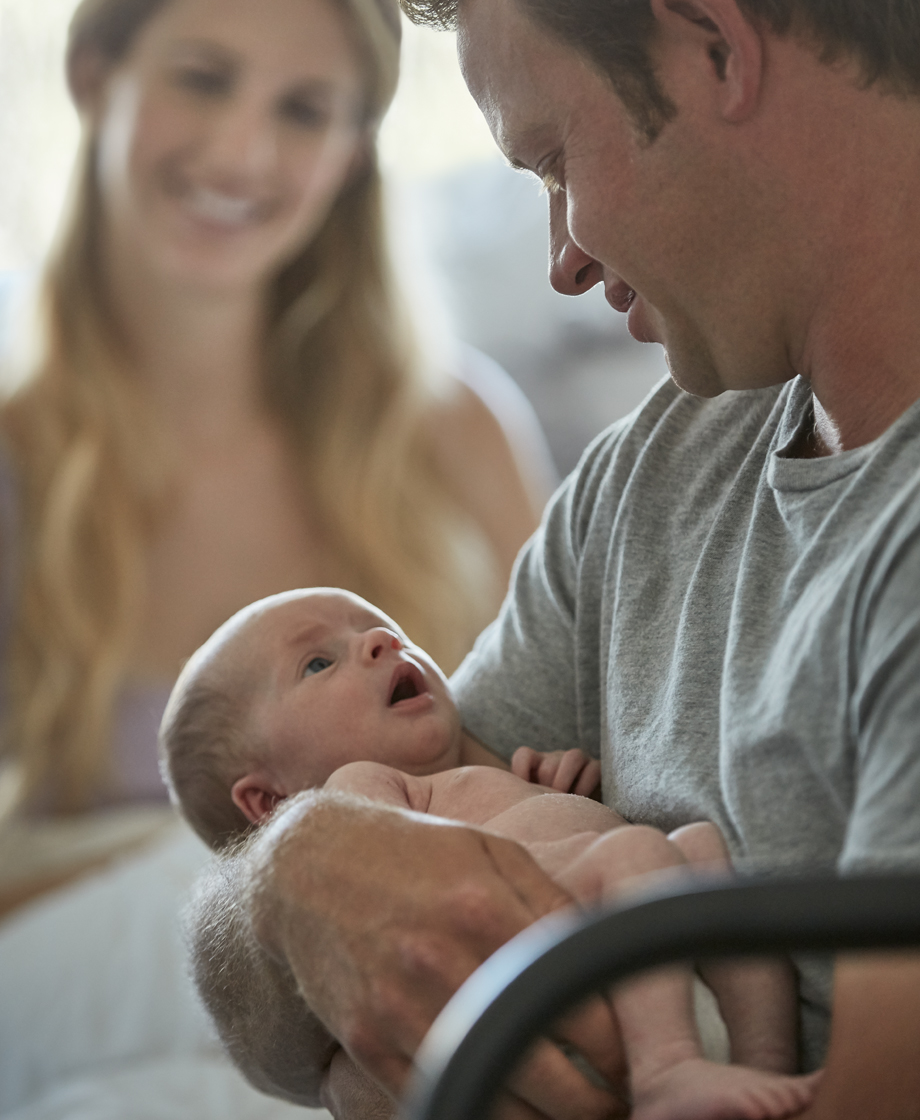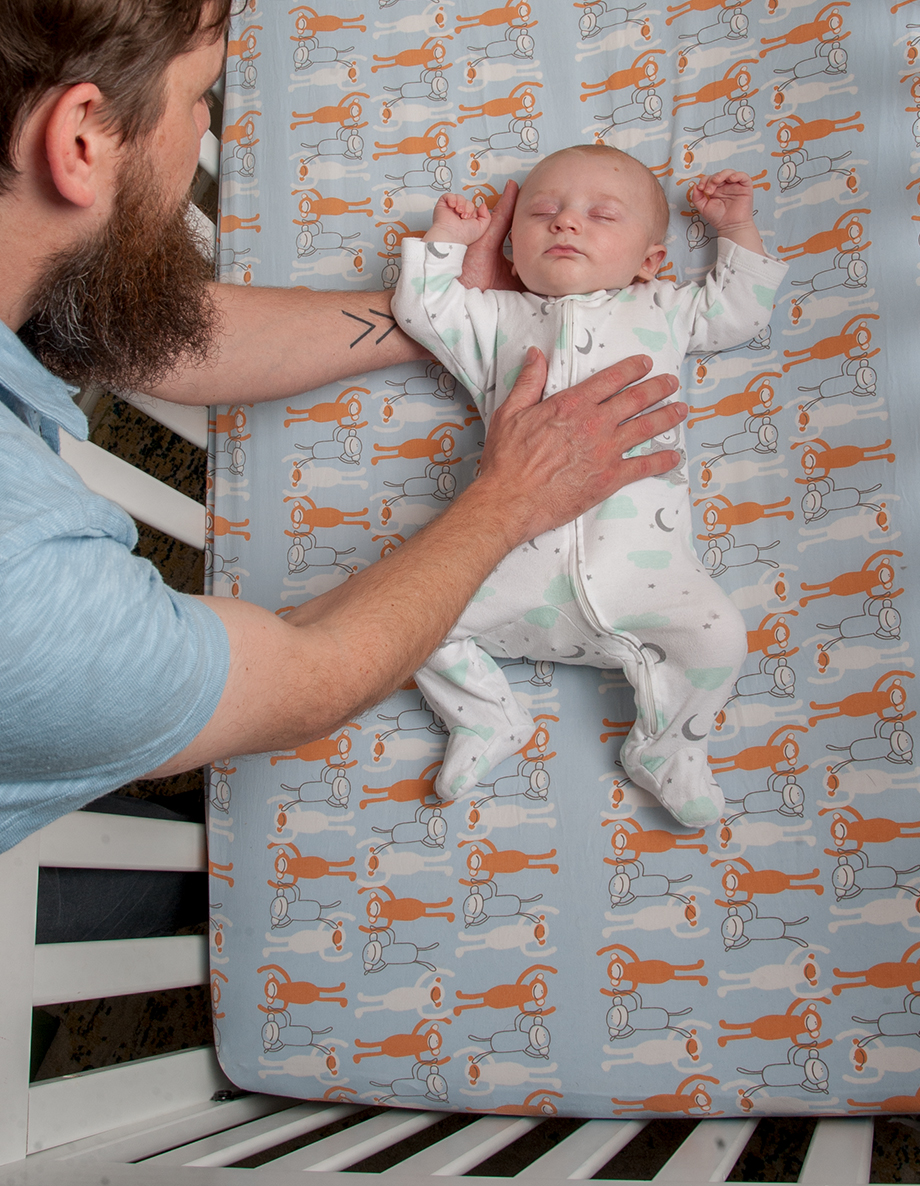Welcome Little One
Congratulations on your new baby! If you’re like most parents, you feel very excited and completely overwhelmed! All babies are different, but their movements and noises will let you know when they’re hungry, happy, uncomfortable, or just tired. You will soon learn your baby’s cues and become your newborn’s superhero.
Is My Baby Hungry?
Newborns need to be fed often. If you look for baby’s early hunger cues, you can offer food to your baby before she starts to cry. It’s easier to feed a calm baby.
Hunger Cues
- Turns head to look for breast or bottle
- Sucks on hands
- Smacks lips
Fullness Cues
- Lets go of breast or bottle
- Looks content and relaxed

How Often Should I Feed My Baby?
It’s easy to be confused about how and when to feed your baby, and how much to feed. All babies are different. They eat different amounts from one day to the next. Over time, your baby will eat less often but will eat more at each feeding. Watch for baby’s hunger cues and feed her as soon as she starts showing them. Stop feeding when she shows fullness cues.
Breastfed Babies:
- Breastfed babies should eat at least 8-12 times in 24 hours and most babies will show hunger cues to eat this often. Sleepy babies may need to be awoken to eat 8-12 times in 24 hours.
- Ask your WIC office if you need help with breastfeeding.
Formula-fed Babies:
- Use an iron fortified formula.
- Feed your baby formula when she shows hunger cues and stop feeding her when she shows fullness cues. Never force baby to finish a bottle.
- As your baby grows, little by little, offer more formula.
- If your baby takes breastmilk and formula, try to offer the breast first. Also, breastfeed the baby more often when you are with her. Ask your WIC office if you need help with breastfeeding.
Why Do Babies Cry?
Babies cry. Some cry a little, some cry a lot. It’s one way they can tell you what they need.
Just remember that:
- Crying can be stressful but it’s normal.
- Crying doesn’t always mean your baby is hungry.
- Many babies cry more in the evening.
- As your baby grows older, she will cry less.
- It’s temporary.
By crying, your baby could be telling you:
- I need something to change.
- I would like some quiet time.
- I need my diaper changed.
- I need to be close to you.
- I am too hot or too cold.
- I need to be burped.
- I don’t feel well.
- I am hungry.
- I am afraid.
- I am tired.

Calming Your Baby
What can you do to help calm your baby?
- Speak or sing softly.
- Rock, sway, or bounce your baby gently.
- Gently massage her back, arms and legs.
- Hold your baby close to you.
Be patient. Calming a baby takes time. Babies calm most easily when sounds and actions are repeated. Stick with what you’re doing for a few minutes before you try something new — this can be the secret to success. If your baby keeps crying or gets more upset, then move on to something else on the list.

Crying Can Be Frustrating
Calming a crying baby takes time. This can be exhausting for new parents.
Find ways to keep yourself calm while your baby is crying.
- Ask a friend or family member to give you a break by helping with your baby.
- If you start to feel angry or upset, lay your baby down in a safe place for a few minutes and take a break. Never shake your baby.
- Keep in mind, babies cry less and less as they get older. Things will get better!
- Contact WIC or doctor if you think your baby is crying too much.

Why Does My Baby Wake Up at Night?
Newborns sleep a lot, but they do not sleep like adults. Most newborns take many short naps during the day and night. Babies are supposed to wake up at night, but it can be hard for new parents. Knowing what to expect will help you feel more relaxed and confident.
- Waking at night is important to keep your baby healthy.
- Their stomachs are so small that they often wake up hungry.
- Babies wake up to make sure you’re near — to feel safe and comfortable.
Tips for Sleepy Parents
For a few months, your sleep will be in short 2-3 hour stretches. Remember, waking up during the night is important for your baby’s health.
The following tips may help you get a few more minutes of sleep:
- Keep baby close at night.
Put your baby’s crib or bassinet in your room for the first few months. - Try some “white noise.”
Play music softly or turn on a quiet fan so you won’t wake up because of every new sound your baby makes. You will still hear your baby when he really needs you. - Keep the lights low.
Keeping lights low while you feed, burp or change diapers helps you both get back to sleep faster. - Sleep when your baby sleeps.
While it seems impossible at first, try to go to sleep when your baby sleeps. Even 90 minutes of sleep can help you feel more rested. - Ask for help.
Taking care of a little one is hard work. Ask family and friends for help at home.

Safe Sleep: Your Baby Needs Your Protection Even When She’s Asleep
Here are steps to follow every time baby goes to sleep.
- Always put baby down to sleep on her back.
- Baby should sleep on a separate, firm sleep surface with no pillows, blankets, stuffed animals, or toys. Avoid curtains or window shades that could be pulled into the sleep area.
- Baby should sleep in the same room with you but not in the same bed. You can bring your baby into your bed to breastfeed, but she should be returned to her own sleep surface, such as a crib or bassinet, after each feeding.
- Baby should never sleep on a sofa or other soft surface.
- Baby should be dressed appropriately for the room temperature. Babies don’t need to wear extra layers of clothes. A sleeper or sleep sack should keep her cozy if the room is cool. Some young infants feel more secure when they are swaddled, or wrapped in a blanket. Swaddling may help calm a fussy baby, but the blanket should be removed before she goes to sleep.
- All caregivers should know and follow these safe-sleep practices.




 Have any questions?
Have any questions?
